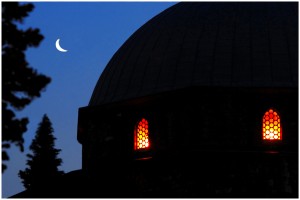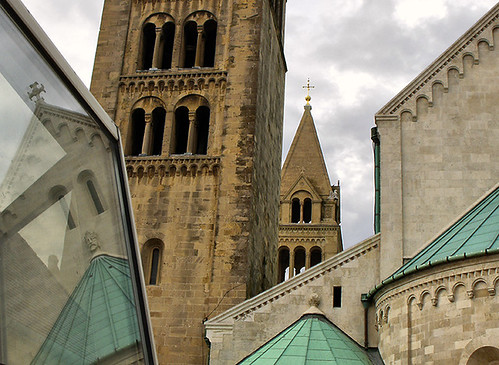This year the European Capital of Culture title is held by three cities: Essen (on behalf of the Ruhr area) in Germany, Istanbul in Turkey and Pécs in Hungary.
The opening ceremony of the season in Pécs was January 10, but debates had started right away when the preparations had been launched. The Western Hungarian city doesn't lack bad rumors about organization, renovations and construction related to the title. After the ceremony on Sunday the online debate became more intense, and even on the Facebook page of the cultural capital (HUN) netizens discussed articles and comments criticizing the details of the whole process going on.
Some citizens instead focused on promoting the city by themselves: there's a pool of Pécs bloggers at ekf-pecs.hu (HUN), and a photoblog at pecs2u.eu collecting and sharing the image of Pécs, as the citizens like Leslie Szendrő see it.

The Djami of Pasha Gazi Kasim is the symbol of the city's cultural diversity. It was built during the Turkish rule in the 16th century, then was turned into a church by the Jesuits. Photo courtesy of Leslie Szendrő
The slow start of the preparations was partly attributed to the difficulties at the municipality: the mayor of the city, László Toller, had a serious car accident in 2006—not long before the final decision on the European Capital of Culture—after which he was in a coma for weeks, and in 2009 he was officially declared incapacitated. Péter Tasnádi succeeded Toller as the mayor of Pécs, but in 2008 he announced that he was suffering from a serious disease; he decided to continue his work, however, but, unfortunately, died at the beginning of 2009 (HUN). After some inefficient by-elections, Zsolt Páva from the party in opposition was elected mayor in May.
Éva S. Balogh of Hungarian Spectrum commented on the Pécs mayoral election's result last year:
[…] What will happen in Pécs? Páva is promising to look into the alleged corruption cases but I doubt that he will suddenly find the billions lost. The government cannot “punish” Pécs even if they wanted to: next year Pécs will be one of two “European cultural capitals.” It would be a terrible blow to the country's reputation if Pécs were as unprepared next year as it is now. The relationship between the two parties in the city is not as vicious as in some other towns. […]
The mentioned “unpreparedness” provided inspiration to the activists of a fake political party: they started a website called pecs2100.hu (HUN) to make fun of the official pecs2010.hu by listing strange programs and sharing fake information about the city, for example referring to it as a city called Peć in Kosovo.
There were discussions going on about the concert and conference hall connected to the project, still far from ready and about the constructions still taking place. The day before the opening ceremony, an architect, Miklós Koós, published a post with photos (HUN) about the central Széchenyi Square and other places. He wrote:
[…] Only a few of the public spaces have been constructed, but this is the smaller problem, the bigger is that Széchenyi Square, which is considered to be the heart of the city, was handed over temporarily, it's not that it was received well by the citizens of Pécs, but they were by line and level upset and they are peppery, because what they saw there was a dilettante work. […]
Finally, the day of the opening ceremony arrived. The event started with the speech of the mayor, Zsolt Páva, and of the Hungarian prime minister, Gordon Bajnai. (The whole ceremony is available at the Hungarian public TV's website.)
Placido Domingo, the chief patron of the 2010 European Capital of Culture (ECC) programme in Pécs, greeted the celebrating people with a video message, in which he referred to the multicultural background of the city by saying: “The richness of Pécs has captured me, too. Ancient Rome, Christianity and Islam live together here. Just like Renaissance and the Age of Reason, la belle époque of the 19th century and the relics of 20th century modern art.”
Annamária Apró reported (HUN) from the opening ceremony for UnivPécs (University of Pécs) magazine's blog (HUN):
[…] Placido Domingo is also sending a word on the screens as the patron of the ECC. Afterwards, big white puppets are starting to march and behind them loads of pupils, one after another, there's sound and light, though I can follow this mostly on the screens, the stage is totally hidden. The actors, dancers and musicians are representing the important periods of the history of Pécs, the background to this are the changing patterns painted on the Djami, the painting with the lights is really enthralling. On the stage the Roman Age, the Paleochristian Period, the foundation of the university is appearing till we arrive to our times. […]
The fireworks fading in from the mist at the floodlit square are spectacular, as the whole opening ceremony, there're no bloopers, finally everything's succeeding, the TV spectators are surely content, too. I just don't feel like it is addressing me, the citizen of Pécs, that it wants to touch me, involve me, make me not only stand and stare at what's happening around me, but to want to embrace the city, my city, the cultural capital.









3 comments